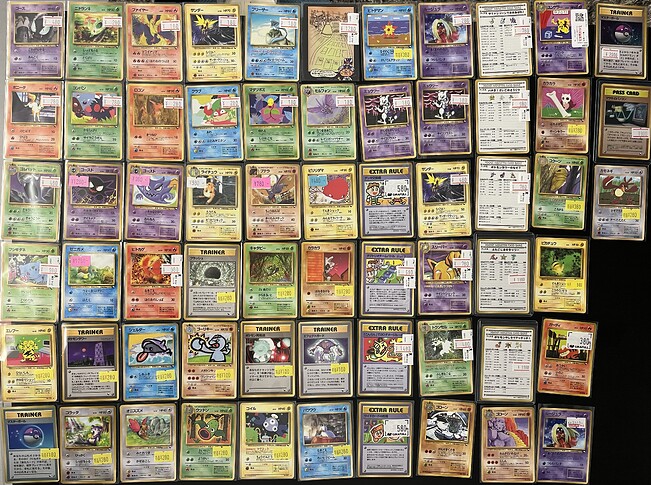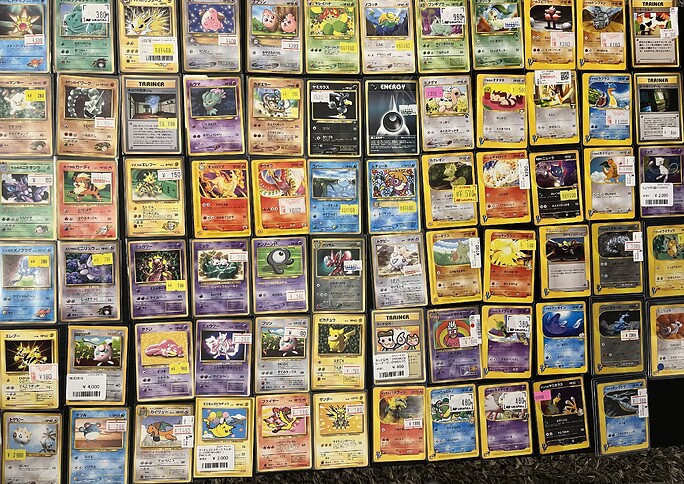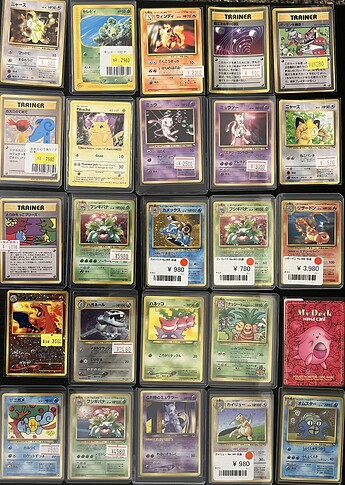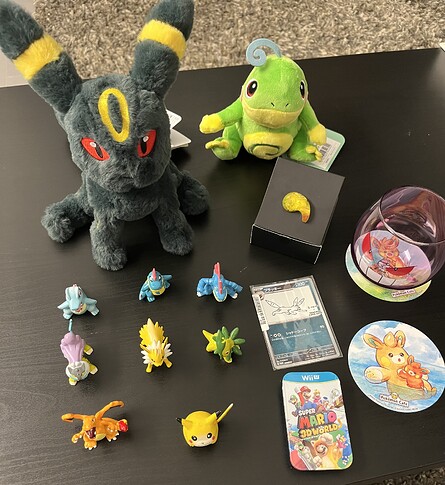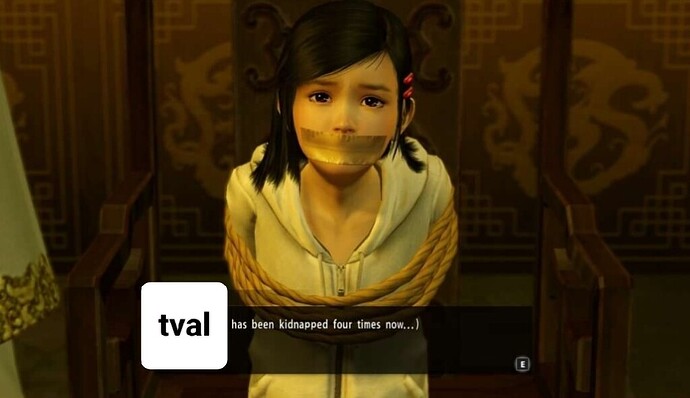I suppose there’s no right or wrong answer, and perhaps a separate post is warranted to create a solid forum for discussion on this as I don’t want this post to spiral but the best I can do is offer my own perspective and experience with this.
——
If you’re going in thinking “Japan is the middle east let’s haggle” then it’s a bad look all around and also very unfounded given there’s no correlation in the cultures. I treated these discussions no different than I do with eBay sellers and card shops in the US. Certain things are negotiable and others aren’t but the real goal is to have a win-win between both buyers and sellers.
Just like in the US where food, clothing, hotels, etc are all non-negotiable of course the same applies to Japan. Thinking anything else would make us look pretty dumb.
——
It’s my personal opinion (and acknowledge that we’ll never get to a consensus here since it’s not a provable fact) that collectibles is a negotiable market no matter where you are.
My 3 biggest reasons are:
-
Unless graded by PSA, card condition is a debatable subject. There are no hard lines
-
The market value changes every day. At the time the card was priced the opportunity cost will likely be out of date.
-
Lastly, and most importantly, every one of these store operators negotiated to buy each card previously. They post maximum offer prices and then when a local comes in to sell they evaluate the cards and negotiate with them. It’s the number one reason a card shop has a negative review is because the shop owner negotiated too hard to procure at a low price. This is the most important point because it means that regardless of whether you’re in the US, Japan, or France the people you are buying from are negotiators themselves, and are used to the process. Even if it’s less common for buyers to ask about it, it’s still a process that they themselves do.
———
Now, just because point (3) holds doesn’t mean “negotiate everything until you win”. The real beauty of this is when both parties can walk away happy.
What situations would that make sense in?
-
Using a passport to remove 10% taxes: always worth asking since it has no affect on the store when they are authorized by the Japan government to do this and if anything it’s brings in more volume for them. Owners were always excited when I asked about this perk - something that they spent time filing for to offer to customers. Many stores don’t have the authorization so just need to ask beforehand.
-
Asking which spend threshold would make them happy with a deal. This can be a win-win since you’re offering more volume in exchange for a better price per card. If anything this was usually brought up by the card shop and not me
-
Paying in cash. As previously mentioned this isn’t the most ethical on the store-side since they really should be paying fair taxes but most shops immediately took my offer if I added in I’d do cash - it’s very clear that this is a win for them.
-
Huge market price discrepancies. If I saw something that was vastly different in price for the same condition on eBay or another shop I would bring it up. This may not feel like a win-win at first but at the end of the day these shops want to ship volume and it’s not feasible to update the prices of 1000s of cards continuously. If the price is < 5% different then don’t waste their time. But if it’s very significant (e.g. double) then bringing it up actually helps them realize why the card hasn’t been selling. You basically did some QA for them. Again, don’t justify this as “you doing them a favor” if it’s a small delta - but in the case of very outdated prices on niche cards chances are the card was collecting dust because no one bothered to raise the question.
——
Okay now on the point that I think added the most controversy above - and clearly wasn’t intended to: asking to negotiate even when it seems like you can’t.
This is on me for not adding more color to this since it could easily be misinterpreted as “I want this for $10…no…please…no…please…no”. Don’t do that. It’s rude.
What I meant by this is 2 things:
(1). Looking at the 4 strategies above, I often found conversations would go like this:
A: “Is this negotiable?”
B: “No sorry!”
A: “No worries! Totally understand. I do want to clarify though, even if I buy both of them in cash?”
B: “oh possibly! what price were you hoping for?”
All to say, I didn’t mean “keep pressing your number” but rather “find out what would help them”.
(2). In a similar vein, you need to politely find out if it’s negotiable before going too deep on prices. Otherwise it will come across as rude. A big mistake here is talking to an associate at a corporate / chain card firm like Girafull or Clove who has no ability to reevaluate prices. Usually they would say nothing was negotiable and I would ask if there was someone who evaluated prices that I could offer a deal with. Once I was speaking to person in charge of that then the usual flow above to identify if there were any win-win scenarios took place (something that would have been impossible and a waste of time if I was speaking with an employee who didn’t have the authority to reevaluate anything).
Conclusion here: as the comments above highlight, there are ways this can go wrong if you are just being a brick wall and asking for a ripoff. But try to understand if the first no is because of both sides jumping to conclusions vs. if there’s actually a win-win scenario.
——
A separate aside that I think is valuable: negotiation is usually assumed to be slimy or anxiety inducing. However, nearly every academic study on this stuff highlights that it’s actually a great way to form relationships. In fact, 3 of the shop owners gave me their emails and phone number (WhatsApp) after in case I ever wanted more stuff.
Whether it’s for an apartment, a new job, or something as basic as Pokemon cards if you can authentically and politely find out if something is negotiable then it can be a win for everyone. It’s just a dance that requires practice and authenticity.
Another fun fact: once you find out whether something is negotiable, taking the first offer actually makes sellers less happy in hindsight (all academically studied multiple times with high statistical significance - peer review isn’t a perfect system but it’s the best we’ve got).
If you think about the psychology of it it make sense: if you entered a negotiation on a job offer and told the recruiter “I’ll work for $60k” and they immediately say yes you’ll probably wish you had asked for more. But when both sides are hesitant and asking more questions or throwing in side offers then at the end both parties feel better on average, even if it’s a worse deal which is crazy to think! It goes both ways, paying more than market on a card that you negotiated down slightly but still not enough gives you a feeling that you “earned this one”, maybe you psychologically think the condition is better or you just feel good that you shaved off 5% even though deep down you know it’s still 10% above market.
Of course, being too aggressive or making really bad deals and being on the losing end don’t apply here. But for all the stuff in the middle the research is fascinating. I can DM folks with research papers if anyone is intellectually curious here.
—-
I’ll end with a few final comments:
-
Make sure you pass the red face test (if you even get to the point that something is negotiable). I didn’t even bother asking for a different price on the CD Venusaur that was like $5. At that point just give them some business. If you were a seller what would you want / take? Don’t lie to yourself
-
When asking if there was someone who had the ability to reevaluate condition or price I was always fully prepared for the case that the price could actually go up not down. My point (2) on why this is a negotiable market goes both ways and they may increase an outdated price in a haul. This wouldn’t be fair if they did it to someone trying to check out normally but it’s fair game if you enter a negotiation - can’t leave a negative review for that when you are the one who started the conversation of reexamining the price.
-
If you’re doing this to flip the cards rather than enjoy them for life then I really do hope you reconsider. It’s a lose-lose here. In this case the shop owner gets less and the future owner of the card still has to break the bank to pay the original price when you’re just a middle man. It’s a loss for you too because if you put the exact same amount of time into just studying finance or something I promise you’ll make way more money with a disciplined approach in real investing not card flipping. Leave Pokemon to the people that actually want to own the card to bring them joy.
——
I’m sure some folks will agree and others will disagree with my perspective above. That’s okay. As said there’s no right or wrong answer but just assume good intent and do try to get to know the shop owners who are fun to talk to about the hobby. I don’t want this post to become a typical comments section with fighting. I think the two comments above calling me out have some validity to them and I tried to clarify in a way that still keeps both points valid (negotiating can be good, but also don’t be rude and do it right).
Hoping this is genuine and helpful for another fan out there. I’ll be off in surgery later today so will likely revisit this thread in a few days when I’m recovered - wish me luck! 

![]()
